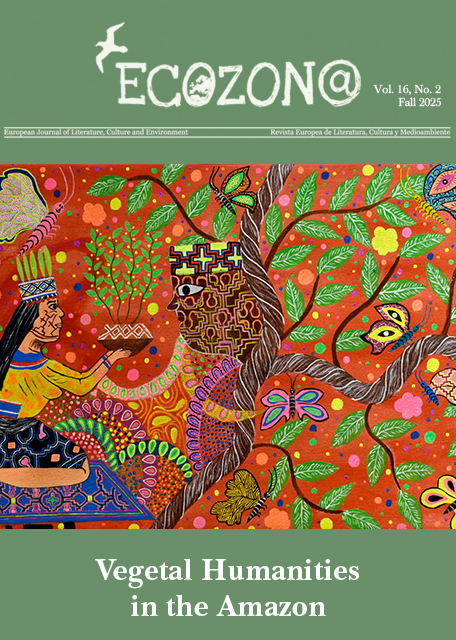Vom kreatürlich Erhabenen zum solastalgisch Erhabenen in Kerstin Ekmans Roman "Wolfslichter" ("Löpa varg")
DOI:
https://doi.org/10.37536/ECOZONA.2025.16.1.5551Parole chiave:
Mensch-Tier-Verwandlung, das kreatürlich Sublime, Erinnerung, das solastalgisch Sublime, Ökomaskulinität, Kerstin EkmanAbstract
Ausgehend von Horkheimer und Adornos Kritik am patriarchalen Mythos der Natur als Jagdgebiet sowie Ursula K. Le Guins Verwerfung der Heldengeschichte als killer story, untersucht der Artikel, wie diese hegemonialen Narrative der Naturbeherrschung in Kerstin Ekmans Roman Wolfslichter (Löpa varg, 2021; dt. 2023) einer kritischen Revision unterzogen werden. Eine textnahe Analyse zeigt, wie die Begegnung des Protagonisten mit einem Wolf zu einer Erfahrung des kreatürlich Sublimen wird, die sein instrumentelles Naturverhältnis radikal in Frage stellt. Während er sich einerseits Natur mimetisch angleicht und, rational nicht fassbar, als Wolf umgeht, erkennt er andererseits seine Mitschuld an der Zerstörung des Ökosystems Wald. Die schuldbesetzte Erfahrung von Umweltzerstörung und Verlust wird ihm zu einer Erfahrung des solastalgisch Sublimen, die ihn letztlich jedoch befähigt, sich für den Erhalt gesunder Ökosysteme einzusetzen. Was das für sein Verständnis von Männlichkeit heißt, wird abschließend über den Begriff der Ökomaskulinität diskutiert.
Downloads
##submission.downloads##
Pubblicato
Fascicolo
Sezione
Licenza
Authors who publish with this journal agree to the following terms:
a) Authors retain copyright and grant the journal right of first publication with the work simultaneously licensed under a Creative Commons Attribution License that allows others to share the work with an acknowledgement of the work's authorship and initial publication in this journal (CC BY-NC for articles and CC BY-NC-ND for creative work, unless author requests otherwise.
b) Authors are able to enter into separate, additional contractual arrangements for the non-exclusive distribution of the journal's published version of the work (e.g., post it to an institutional repository or publish it in a book), with an acknowledgement of its initial publication in this journal.
c) Authors are permitted and encouraged to post their work online (e.g., in institutional repositories or on their website) prior to and during the submission process, as it can lead to productive exchanges, as well as earlier and greater citation of published work (See The Effect of Open Access).










